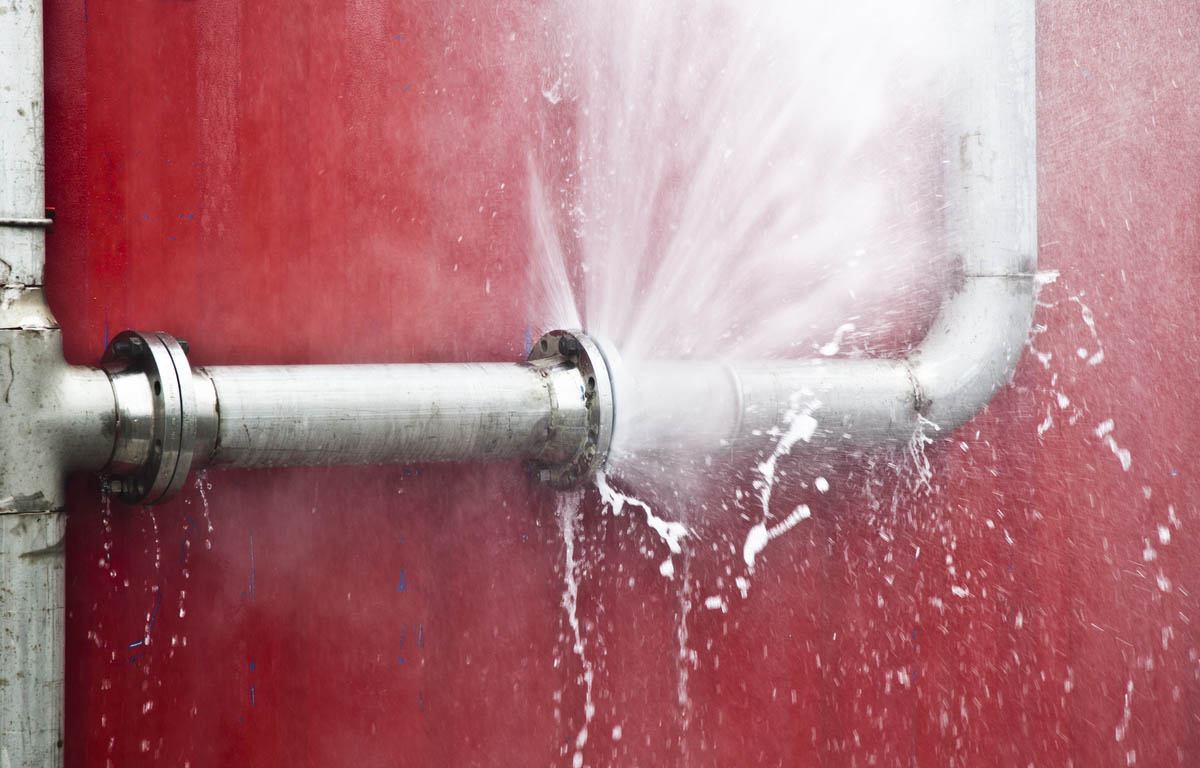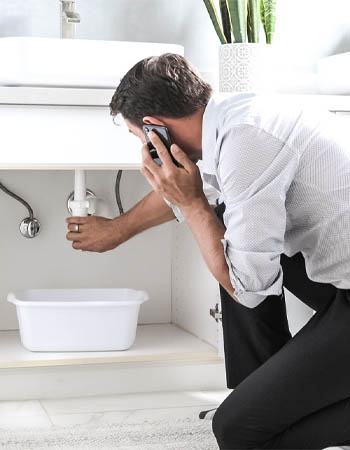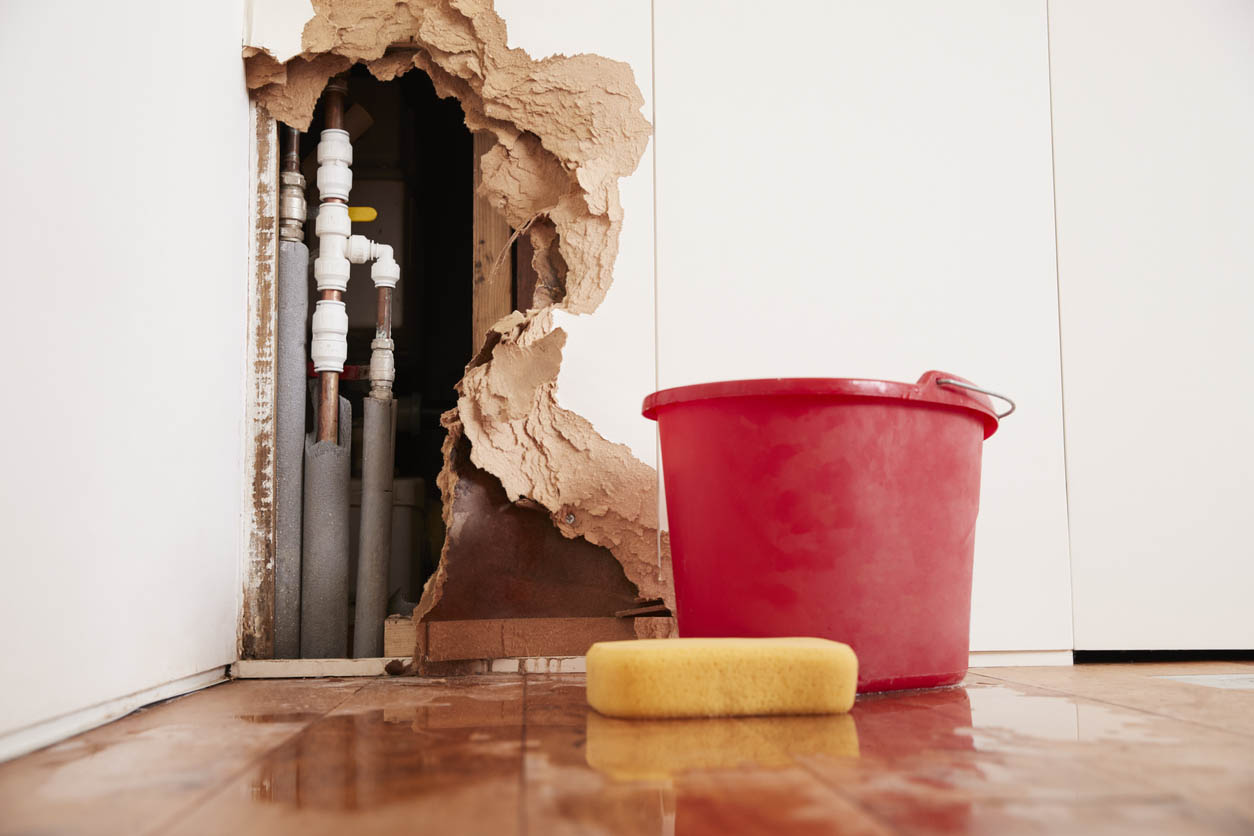
Burst pipes aren’t just a hassle; they can cause hundreds of dollars worth of damage. Homeowners will want to know exactly when this issue is covered by homeowners insurance—and when it isn’t.
Updated on Jan 31, 2024 9:56 AM EST

We may earn revenue from the products available on this page and participate in affiliate programs. Learn More ›
A: The short answer is yes, homeowners insurance does cover pipes that burst. According to Angel Conlin, chief insurance officer with Chicago, Illinois–headquartered Kin Insurance, “Home insurance usually covers burst pipes when the damage is caused by perils already included in your policy.” Some examples of these perils include “water damage if it is caused by rain or snow, plumbing (e.g., burst pipes, frozen plumbing, faulty plumbing, accidental overflow), water damage from extinguishing a fire, a leaky roof, accidental overflow of an appliance or fixture (e.g., toilet, sink, washing machine), mold that results from covered water damage, or vandalism,” says Conlin.
While these examples cover a wide variety of scenarios, there are situations where burst pipe water damage will not be covered by homeowners insurance. One important distinction is that homeowners insurance does not typically cover the replacement or repair of the pipe itself, only the damage that resulted from the pipe bursting. In other words, coverage may extend to drywall repair, mold remediation, or replacing damaged furniture, but not to burst pipe repairs. It’s also worth noting that if it can be proven that the pipe burst as a direct result of neglect on the part of the homeowner, the chances of receiving any coverage are slim.
Those dealing with a burst pipe will want to learn the intricacies of this issue and how they apply to their situation. It’s also a good idea for the policyholder to refer to their specific policy to understand exactly what it covers and what it does not cover.

Is water damage covered by insurance? It depends; homeowners insurance covers perils that are listed in the policy. Examples include windstorms, lightning, fire, vandalism, and theft. If a pipe burst under these conditions in a way that was sudden and accidental, and the pipe had been operating normally and had been properly maintained by the homeowner, it would most likely be covered under homeowners insurance if it were to burst. For example, homeowners may ask, “Does homeowners insurance cover frozen pipes?” Yes, it can also cover a frozen pipe that burst, provided proper precautions were taken to keep the pipes from freezing in the first place.
However, if a water pipe burst in the house because the pipes were old or there was a lack of maintenance, it’s likely the claim will be denied. So, does homeowners insurance cover water damage? As it relates to a burst pipe, the best homeowners insurance policies (such as one from Allstate) will generally cover accidental discharge or overflow of water or steam from heating, plumbing, air conditioning, or automatic sprinkler systems.
When a home undergoes water damage from a burst pipe, there are typically three parts of the homeowners insurance policy that can cover the burst water pipe. The first of these is dwelling coverage. Dwelling coverage encompasses any part of the home or other insured structure that sustained damage from the burst pipe.
Wondering what type of water damage is covered by homeowners insurance? To provide one example, if a pipe burst in a wall in the basement causing damage to the walls and floors, dwelling coverage would cover flooded basement cleanup and related repairs, less the deductible. In some cases mold remediation or other types of water damage restoration may also be necessary.
“Dwelling coverage helps pay for repairs to the home’s physical structure,” explains Conlin. “In the case of burst pipes damaging floors, walls, or other structural parts of your home, your dwelling coverage will help pay to repair the damage.”
It’s important for policyholders to understand their policy’s dwelling coverage limit, which is the highest dollar amount that the insurance company will contribute toward paying for home repairs. It’s generally recommended that homeowners choose a dwelling coverage limit that would cover replacing the entire home.
The second part of the homeowners insurance policy that can cover the burst pipe is personal property coverage. In the case of a burst pipe, it’s likely that water damage has reached whatever personal possessions are in the vicinity. For instance, if a pipe burst in the basement, it might soak items being stored down there. So does home insurance cover water damage to possessions inside the home? In many cases, the answer is yes. “Personal property coverage helps pay for repairing or replacing your belongings, such as furniture, clothing, and electronics if they’re damaged or destroyed by a covered event—in this case, a burst pipe,” explains Conlin.
But exactly how much does insurance pay for water damage? That depends on the individual policy coverage, but in general, a policy will either pay cash value, which is the depreciated value of the item, or it will pay the replacement cost for each item, which is what it will cost to buy the same item at today’s prices. Those who opted for additional coverage when shopping for their insurance policy and deciding how much homeowners insurance they need may receive coverage for full replacement costs. It’s worth noting that homeowners insurance provides both property and liability protection. This means that coverage extends to the homeowner even if they’re away from their home and are responsible for causing damage or injury to a third party.
The third type of policy that applies to a burst pipe is loss of use coverage. According to Conlin, “Loss of use coverage helps pay for living expenses if you’re temporarily unable to live in your home after a covered event. This may include hotel costs, meals, and other essential living expenses.”
In other words, this type of coverage includes additional living expenses if the residents of the home have to relocate while repairs are completed. For example, if the burst pipe caused so much damage that the homeowner had to stay in a hotel until repairs were complete, loss of use coverage may reimburse the homeowner for hotel expenses that exceed their monthly mortgage payment up to the policy limits. Renters insurance coverage for water damage also works similarly, but it only covers possessions and loss of use.

While figuring out how to get insurance to pay for water damage, it’s important to be aware of the cases in which homeowners insurance will not cover burst pipes. “Most home insurance policies don’t cover every instance,” says Conlin. “If your pipes burst after you’ve failed to take care of minor issues like leaks, fractures, or other regular maintenance, don’t expect your home insurance to cover the damage. [For example], suppose you’ve failed to notice a pipe leak for several months, causing damage to worsen. In that case, your insurance company probably won’t cover the damage that could have been prevented had you been appropriately engaged in the condition of your home and noticed the leak earlier.”
To avoid being responsible for burst pipes, homeowners will want to properly maintain any systems that have water pipes. This includes taking measures to prevent pipes from freezing; regularly checking any hoses, faucets, or water lines in the home for general wear and tear; and understanding how to find a water leak in the home. Signs of rust or other degradation like cracks or leaks mean that these components need to be fixed or replaced. Homeowners will want to shut off the water supply when they go on vacation, and try not to leave the home while the washing machine or dishwasher is running. A burst pipe doesn’t always mean that water is copiously spewing from the pipe and flooding everything. Homeowners will want to learn how to tell if a pipe burst underground by looking for signs like fluctuating water pressure throughout the home, discolored and stinky water, mold growth, odd noises in the walls like clanging, higher water bills than normal, and watermarks on the walls or ceiling so they can move quickly to mitigate damage.
Homeowners may wonder “Does homeowners insurance cover plumbing?” and “Does homeowners insurance cover pipe replacement?” While homeowners insurance will generally cover damage from a pipe that burst suddenly or accidentally, the cost to fix the burst pipe itself may not be covered. This is because basic homeowners insurance covers the actual damage but not the source of the damage. For instance, if a water heater broke and then spewed water all over the basement, homeowners insurance would cover possessions and any part of the dwelling damaged, but it would not pay to replace the water heater, since that would be considered part of regular maintenance by the homeowner and may be covered by a warranty. This same principle applies to burst pipes. Since the pipe was the actual cause of the damage, pipe repair or replacement does not fall into the purview of what is covered under homeowners insurance policies.
“While you’ll still need a plumber to fix the actual busted pipe right away, your policy can cover your damaged cabinets, flooring, walls, and personal belongings up to the coverage limits,” adds Conlin.

Homeowners who have a water pipe burst in the house will naturally wonder, “Does home insurance cover plumbing?” Unfortunately, in most cases, the answer is no. However, this is where one of the best home warranties for plumbing from a provider like American Home Shield or Choice Home Warranty can come in handy. Home warranties fill in the gaps of homeowners insurance coverage by covering systems like plumbing, HVAC, and electrical. So while a home warranty won’t cover water damage, combining a home warranty that covers burst pipe repair costs with a homeowners insurance policy that covers water damage restoration costs for damage caused by a covered loss will protect homeowners for both problems.
It’s important for homeowners to shop around for home warranties to find the one that will cover plumbing systems and to get the best price. Homeowners will want to carefully review any agreements before signing and look for any exclusions to fully understand what the warranty covers. For instance, some home warranties may only repair broken systems or appliances rather than replace them. Homeowners will also want to skip trying to learn how to fix a burst pipe themselves as any attempted DIY repairs may void the warranty.
Plumbing systems aren’t made to last forever, and eventually, pipes will succumb to normal wear and tear. When this happens, their replacement will not be covered by homeowners insurance. Additionally, it isn’t always obvious what causes a pipe to burst, and there might not be any warning signs. However, that doesn’t mean homeowners have no control over the state of their plumbing systems or the damage they may cause. Homeowners can greatly reduce the likelihood of a water damage insurance claim being rejected (and for that matter, of the pipe bursting in the first place) by staying on top of plumbing maintenance. Although there are no specific burst pipe insurance claim tips, getting regular inspections, quickly resolving clogs, thawing frozen pipes before they burst, and keeping reliable records of all service will show the insurance company that there has not been negligence.